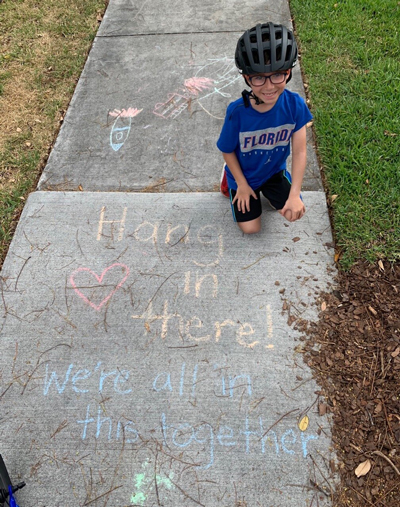My earliest memories of atonement took place at Saint Louis Catholic Church. I remember going to confession with my CCD class when I was eight years old. We entered the sanctuary and waited our turn to be called in one-by-one. I had been going to confession about once a quarter since my first communion (in first grade) so I knew the drill and what to expect; but it still made my stomach turn every time I was called in. I dreaded having to sit in that cold, tiny, tucked-away room directly in front of a priest…not like in the movies where the priest sits on one side of the door and the confessor sits on the other side with their face hidden behind a dark small square panel. Once I was finally called into the confessional, I recall reciting a list of my usual offenses, they were practically memorized by that point: “I get into trouble with my parents some times and they send me to my room. My sister and I fight a lot. I hit her sometimes but I always say sorry right after and we make up”. I remember this one particular confession because this time the priest didn’t let me off the hook that easily. He insisted that I dig deeper and come up with at least one more wrong doing to repent for. I sat there quite nervously and stared at the ceiling, hands folded awkwardly in my lap, palms sweating, feet kicking wildly off the front of my chair as they were still too short to touch the carpeted floor. I wasn’t nervous about confessing to him, I was nervous because I was put on the spot by a priest and I couldn’t for the life of me think of one more thing to tack-on to my confession. I panicked and made something up. I told him that I was mean to a new kid at my school…a complete made up lie. He then laid his right hand over my head and prayed over me and then asked me to join him in reciting the Our Father. I walked out of the confessional with my tail between my legs and immediately felt engulfed by feelings of guilt. I prayed to god (in my head) apologizing for lying to a priest. I am pretty sure god understood and forgave me.

Fast forward 30 years. I am a Jewish woman and it’s the eve of Yom Kippur (the Day of Atonement). I think back on the past year and try my best to recall everything that I have to atone for. While I am proud to say that I can’t think of a single fight being had with my sister (and certainly nothing that involved me hitting her) I am able to think of a much longer list of “wrong doings” that I am truly sorry for. We all have a lot to repent for when we sit down and really think about it.
As a child when it came to atoning my mind always went to the big stuff, well I haven’t robbed any banks or anything like that! So I must be a good person and god knows that. But as an adult and as a Jew I realize it’s not just the big stand-out sins or the obvious wrong doings that we need to ask for forgiveness for today, and it isn’t about being a good person or not. It’s the choices we make and the things we do, both intentionally and unintentionally, knowingly and unknowingly, that we need to reflect on and ask for forgiveness for. It’s the price of being human, and while god does know our heart and our intentions, god also wants us to recognize our missteps and not just atone for them but to change our ways so that each year we can learn from them and grow. How many times do we tell our children, “I know you said sorry, but you keep doing it. Saying sorry is just the first step, now you need to work on not doing it again”. That’s what the priest was trying to get at I think—for me to dig deeper and to recognize the role we all play in “missing the mark”. It’s the hundreds of little things that we do that are hurtful or neglectful or selfish or judgmental or deceitful or boastful or flat out mean spirited. It’s hurting our loved ones, our acquaintances and even complete strangers—whether we mean to or not. Hurting them with our words and also with our silence. Hurting them with our actions and also by our lack of action. It’s things that might seem totally innocent or miniscule or insignificant to us, but could very well hurt someone else.
Every day since March of 2020 has been unlike any other day we have ever had in our lives. This “new normal” as we call it comes with more complexities than I could have ever imagined and with more opportunities to hurt others in unique ways. On the flip side, it also lends itself to new openings for forgiveness, self-reflection and spiritual growth. We are all struggling to come to terms with this pandemic and how we wish to live with it as it continues to change and evolve. I never knew how much I depend on physically being around others. I never knew how much I feed off of others’ energy. I never knew how much of my well-being is based on being outside of the four corners of my house. I never knew how much harm we can cause others—even from a distance and often times without even knowing it.
Around this time last year I ventured out to a Walgreens for the first time in many months. As I stood in the checkout line, 6 feet behind an older man who was paying for his items ahead of me, I couldn’t help but overhear him scolding the cashier as she rang him up. He went off on an angry rant, telling her how CVS offers a much better rewards program and carried on about how Walgreens is taking all of his money. The cashier just stood there, nodding her head and listening politely. At the end of their transaction she apologized to him as she handed him his bags. She had done nothing wrong and yet she was the one saying sorry. The man begrudgingly swiped his card and stomped out of the store like a child who was just told that he can’t have his lollipop. I walked up to the counter and thanked the woman for working and complimented her on how she handled that rude customer. The truth is, who knows what that man was going through when he acted that way—maybe he was looking to pick a fight because he was angry and bitter or maybe he was battling something way bigger. Who knows? We can justify our missteps and make excuses for our actions all day long—we can blame our poor choices or lack of common decency on our lack of sleep or on our stress levels being at an all-time high—but that doesn’t excuse them. I apologized to the cashier on that man’s behalf and today I step back and try to recount the ways I too have been that person in the wrong.
We are all being challenged in new ways this year and it often brings out the worst in us. Maybe we don’t snap at the person ringing up our groceries but we certainly snap at our loved ones, as if that’s any better. I can’t even begin to count the number of times I have said or heard one of my girlfriends say, “I feel so drained”, “I am drinking again”, “I can’t deal”, “I miss my old life”, “I am such a mess”, “I feel so out of shape”, “I feel so tired all the time”, “I am so over this”, “I don’t know how much longer I can do this for”, etc. It is safe to say that we are all emotionally and even physically exhausted right now, but we can do better. We must do better.
This Yom Kippur I am going to challenge myself to have the same amount of compassion for myself as I do for others. I am working to forgive myself, the way I work to forgive others. We all need to learn to show ourselves the same grace that the cashier showed to her disgruntled customer. And we all need to see how we too have been guilty of the same things that we judge others for. When was the last time we truly put ourselves in another person’s shoes? When we see someone that we really cannot stand let’s ask ourselves what about them reminds us of ourselves. We have all been there—we have all been the person on each side the counter…and on each side of the confessional door. We can choose to see the best or the worst in others. We can assume positive intent in others or we can choose to only see the bad. I believe that we can and will do better, but the growth that we seek must start from a place of humility and forgiveness. This is my hope and my prayer for myself and for you today. I am sure god is listening and totally gets where we are coming from, and what led us here, but that’s just the half of it— let’s move past the stage of acknowledging our wrong doings and asking for forgiveness and let’s move to the next stage. The next stage is where we learn from the past and change our ways so that next Yom Kippur our list of things to atone for isn’t identical to the year before. Yes, god forgives us each year but there surely are plenty of lessons to be learned and we are all capable of being so much more than we are today.
By Susie Goldberg, gettingtogetto.com





 Deering Estate
Deering Estate
 Massage Envy South Miami
Massage Envy South Miami
 Calla Blow Dry
Calla Blow Dry
 My Derma Clinic
My Derma Clinic
 Sushi Maki
Sushi Maki
 Sports Grill
Sports Grill
 The Healthy Kitchen
The Healthy Kitchen
 Golden Rule Seafood
Golden Rule Seafood
 Malanga Cuban Café
Malanga Cuban Café

 Kathleen Ballard
Kathleen Ballard
 Panter, Panter & Sampedro
Panter, Panter & Sampedro
 Vintage Liquors
Vintage Liquors
 The Dog from Ipanema
The Dog from Ipanema
 Rubinstein Family Chiropractic
Rubinstein Family Chiropractic
 Your Pet’s Best
Your Pet’s Best
 Indigo Republic
Indigo Republic




 ATR Luxury Homes
ATR Luxury Homes


 2112 Design Studio
2112 Design Studio
 Hamilton Fox & Company
Hamilton Fox & Company
 Creative Design Services
Creative Design Services
 Best Pest Professionals
Best Pest Professionals
 HD Tree Services
HD Tree Services
 Trinity Air Conditioning Company
Trinity Air Conditioning Company
 Cisca Construction & Development
Cisca Construction & Development
 Mosquito Joe
Mosquito Joe
 Cutler Bay Solar Solutions
Cutler Bay Solar Solutions


 Miami Royal Ballet & Dance
Miami Royal Ballet & Dance
 Christopher Columbus
Christopher Columbus
 Pineview Preschools
Pineview Preschools
 Westminster
Westminster
 Carrollton
Carrollton
 Lil’ Jungle
Lil’ Jungle
 Frost Science Museum
Frost Science Museum
 Palmer Trinity School
Palmer Trinity School
 South Florida Music
South Florida Music
 Pinecrest Orthodontics
Pinecrest Orthodontics
 Dr. Bob Pediatric Dentist
Dr. Bob Pediatric Dentist
 d.pediatrics
d.pediatrics
 South Miami Women’s Health
South Miami Women’s Health

 The Spot Barbershop
The Spot Barbershop
 My Derma Clinic
My Derma Clinic




 Miami Dance Project
Miami Dance Project

 Rubinstein Family Chiropractic
Rubinstein Family Chiropractic
 Indigo Republic
Indigo Republic

 Safes Universe
Safes Universe
 Vintage Liquors
Vintage Liquors
 Evenings Delight
Evenings Delight





 Atchana’s Homegrown Thai
Atchana’s Homegrown Thai
 Baptist Health South Florida
Baptist Health South Florida

 Laser Eye Center of Miami
Laser Eye Center of Miami
 Visiting Angels
Visiting Angels
 OpusCare of South Florida
OpusCare of South Florida

 Your Pet’s Best
Your Pet’s Best





 HD Tree Services
HD Tree Services
 Hamilton Fox & Company
Hamilton Fox & Company


 Creative Design Services
Creative Design Services